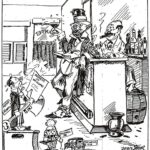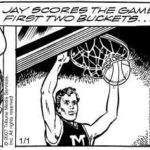A Duluth to be Proud Of
“I remember the young people on the trip who said, ‘How come we’re not learning this in school? How come we didn’t know that this had happened?’ …it’s an American story.” –Carl Crawford – Human Rights Officer, Duluth to Montgomery Reflections.
We Duluthians are a proud people. We’re proud of our cityscape and the landscape around us. We’re proud of our ability to withstand the cold, even as we complain about it. We’re proud of our ability to move forward, as Mayor Emily Larson expressed in her open letter to the Rolling Stones this past summer. We Duluthians pride ourselves in the fact that we don’t hide from issues but rather actively engage with them. It was this Duluth pride that prompted a new, local podcast from the NAACP.
In April 2018, thirty-five delegates from Duluth attended the opening of the National Memorial for Peace and Justice in Montgomery, Alabama, visiting other sites of racial terror along the way. These members, leaders, and elders of our community came back with powerful stories to tell about their journey. After hearing some of delegates speak at a meeting, Duluth’s NAACP was moved to record these accounts, to offer up to our neighbors and our posterity an opportunity to engage with our place in history.
Duluth is no stranger to racial terror. On First Street and Second Avenue East is a memorial to three black men: Elmer Clayton, Elias Jackson, and Isaac McGhie.
In 1920, a mob of thousands of Duluthians hauled these three men into the street and lynched them on a lamppost, crosswise from where their memorial now stands. They were murdered on account of false accusations levied by a young, white woman and her boyfriend. Isaac McGhie was the oldest out of the three at 20 years old.
For many decades, after the mob was scolded – not for the effect the lynching had on the victims but for tarnishing the name of the city and the state – Duluth collectively forgot the lynching. However, in 2000, a grassroots movement was formed by Duluth community members who refused to forget the three men whose lives were taken here in our city. Together they planned, petitioned, worked, and finally in 2003, unveiled the Clayton Jackson McGhie Memorial.
It’s community-inspired movements like these that make sure important lessons are not lost to us, that people’s voices are not swallowed up by the march of time. This is why Duluth’s NAACP has begun the Duluth to Montgomery Reflections podcast. Our elders, our peers, and our neighbors have all returned with stories – American stories, as Carl Crawford emphasized – that are relevant to us today and to our future generations.
Community elder Sharon Witherspoon opens the latest reflection by telling us that these stories aren’t always easy, “It’s painful to me to sit back and remember. Sometimes, due to the pain you feel, you almost want to forget some of those things that I’ve experienced. But I’m going to try to retrieve this information and move forward.”
That’s the important part, an ongoing theme not only in Sharon’s interview but in all the reflections: to move forward. The Duluth NAACP has released a content warning along with these interviews, as some of the events relayed are difficult and unsettling. Sometimes it just seems easier to forget these painful events ever happened, but without engaging them we can never move forward.
We wouldn’t be the Duluth we’re proud of if we didn’t engage with the domestic violence and drug issues Mayor Larson wrote about. We wouldn’t be the Duluth we’re proud of if we never had that grassroots movement that became the Clayton Jackson McGhie Memorial. And we’re delighted to see that the Duluth we’re proud of is not shying away from these reflections either. Both the University of Minnesota-Duluth and University of Wisconsin-Superior have brought the podcast into their curriculums. We can’t wait to hear the conversations these reflections inspire not only in the classroom but out in our communities as well.
New episodes of Duluth to Montgomery Reflections are released every third Wednesday of the month. Links to each episode can be found on the Duluth NAACP’s website.
Further information on the Clayton Jackson McGhie Memorial can be found at the Clayton Jackson McGhie Memorial, Inc. site: claytonjacksonmcghie.org.
Further information on the history behind the Duluth lynchings can be found through a variety of sources, including:
- Online at the Minnesota Historical Society
- Online with David V. Taylor’s oral history interviews of the local African-American community
- The Duluth Public Library’s NonFiction Collection:
- The Lynchings in Duluth by Michael Fedo (Call No. 364.134 F319l)
- The Lyncher in Me: A Search for Redemption in the Face of History by Warren Read (Call No. 364.134 R22l)
- Legacy Violence: Lynch Mobs and Executions in Minnesota by John D. Bessler (Call No. 364.134 B464l)
- Minnesota History Volume 59 (Call No. 364.134 M666)
- Postcard from a Lynching by Chris Julin and Stephanie Hemphill (Call No. 364.134 J944p)
Recommended Links:
Leave a Comment
Only registered members can post a comment , Login / Register Here














No Comments